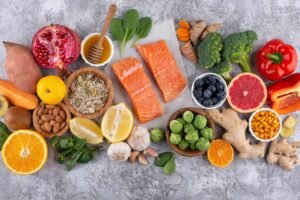Fertility is influenced by a multitude of factors, including genetics, age, lifestyle, and notably, diet. Emerging research suggests that chronic inflammation may impair reproductive health, affecting ovulation, implantation, and sperm quality. An anti-inflammatory diet, rich in whole foods and low in processed items, aims to reduce systemic inflammation, potentially enhancing fertility outcomes.
What Is an Anti-Inflammatory Diet?
An anti-inflammatory diet emphasizes the consumption of foods that combat inflammation and the avoidance of those that may trigger it. Key components include:
- Fruits and Vegetables: Rich in antioxidants and phytochemicals.
- Whole Grains: Such as brown rice, quinoa, and oats.
- Healthy Fats: Including omega-3 fatty acids found in fatty fish, flaxseeds, and walnuts.
- Lean Proteins: Like poultry, legumes, and tofu.
- Herbs and Spices: Such as turmeric and ginger, known for their anti-inflammatory properties.

Conversely, it advises limiting:
- Processed Foods: High in trans fats and refined sugars.
- Red and Processed Meats: Linked to increased inflammation.
- Sugary Beverages: Which can spike insulin levels.
How Inflammation Affects Fertility?
Chronic inflammation can disrupt hormonal balance, impair ovulation, and affect the uterine environment, making conception more challenging. Conditions like polycystic ovary syndrome (PCOS) and endometriosis, which are associated with inflammation, often lead to fertility issues. Reducing inflammation through diet may alleviate these conditions’ symptoms and improve reproductive outcomes.
Implementing an Anti-Inflammatory Diet for Fertility
Adopting an anti-inflammatory diet involves:
- Incorporating a Variety of Fruits and Vegetables: Aim for colorful plates to maximize nutrient intake.
- Choosing Whole Grains: Opt for brown rice, quinoa, and whole wheat over refined grains.
- Selecting Healthy Fats: Include sources like avocados, nuts, and fatty fish.
- Limiting Processed Foods: Reduce intake of packaged snacks, sugary drinks, and fast food.
- Staying Hydrated: Drink plenty of water to support overall health.

How the Anti-Inflammatory Diet Supports Fertility?
Let’s dig a little deeper into why an anti-inflammatory diet might have such a profound impact on fertility. When your body is in a constant state of low-grade inflammation, often caused by poor diet, stress, lack of sleep, or environmental toxins—it can throw your entire reproductive system out of sync.
For women, this could mean irregular periods, hormone imbalances, or difficulties with ovulation. For men, inflammation can reduce testosterone levels and impair sperm quality. Now, when you shift to an anti-inflammatory way of eating—think more fresh vegetables, berries, healthy fats like olive oil and avocados, wild-caught fish, and fewer processed foods—you’re essentially telling your body to calm down.
You’re lowering inflammatory markers, balancing blood sugar, and stabilizing your hormones. Over time, this creates a more favorable environment for conception, both naturally and through fertility treatments like IVF. It’s not an overnight fix, but it’s one of those sustainable, long-game strategies that your body and future baby will thank you for.

Exploring the Role of Gut Health in Fertility
Another crucial piece of the fertility puzzle that often flies under the radar is gut health. The gut plays a significant role in regulating inflammation, nutrient absorption, and even hormone balance—all of which are directly tied to reproductive function. An anti-inflammatory diet naturally supports gut health by promoting a diverse microbiome and reducing intake of gut-irritating foods like refined sugars and artificial additives. Fermented foods like yogurt, kefir, kimchi, and sauerkraut, which are common staples in anti-inflammatory eating, help increase the population of beneficial gut bacteria.
When your gut is thriving, your body is better equipped to regulate insulin, metabolize hormones, and minimize oxidative stress—all key elements in maintaining reproductive health. Supporting your gut through an anti-inflammatory approach may therefore enhance your fertility from the inside out.
Additional Lifestyle Considerations
Beyond diet, other lifestyle factors can influence fertility:
- Regular Exercise: Engaging in moderate physical activity can reduce inflammation and improve hormonal balance.
- Stress Management: Practices like yoga and meditation can lower stress levels, which may positively affect fertility.
- Adequate Sleep: Ensuring sufficient rest supports hormonal regulation.
- Avoiding Toxins: Limiting exposure to environmental toxins, such as pesticides and endocrine disruptors, can be beneficial.

Conclusion
While more research is needed to fully understand the relationship between anti-inflammatory diets and fertility, existing evidence suggests that such dietary patterns may offer benefits for individuals seeking to conceive. By focusing on whole, nutrient-dense foods and minimizing inflammatory triggers, an anti-inflammatory diet could serve as a natural approach to enhancing fertility.


